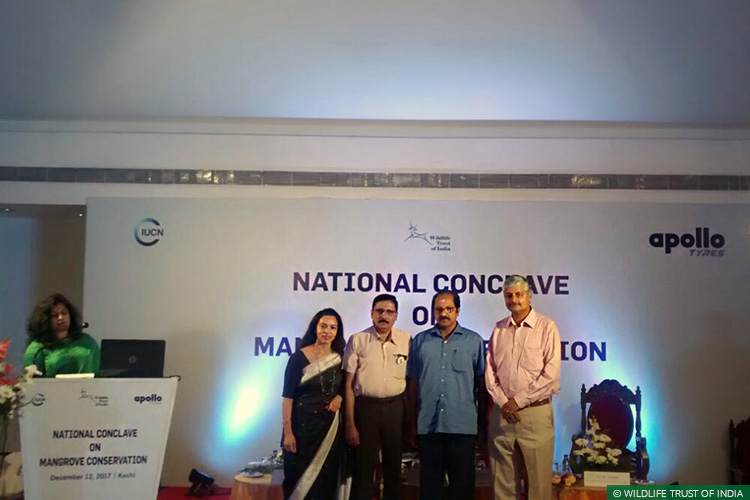 Cochin, Kerala, December 12, 2017: A one-day National Conclave on Mangrove Conservation was organised today by Wildlife Trust of India (WTI) and Apollo Tyres Ltd with support from the International Union for the Conservation of Nature (IUCN). The conclave aimed to create a platform for policymakers and members of the academic and business communities to come together to channelise positive action on mangrove conservation – one of the prime objectives of the WTI-Apollo Tyres Kannur Kandal (Mangrove Restoration) Project in Kerala.
Cochin, Kerala, December 12, 2017: A one-day National Conclave on Mangrove Conservation was organised today by Wildlife Trust of India (WTI) and Apollo Tyres Ltd with support from the International Union for the Conservation of Nature (IUCN). The conclave aimed to create a platform for policymakers and members of the academic and business communities to come together to channelise positive action on mangrove conservation – one of the prime objectives of the WTI-Apollo Tyres Kannur Kandal (Mangrove Restoration) Project in Kerala.
The conclave aimed to create a platform for policymakers and members of the academic and business communities to channelise positive action on mangrove conservation
The conclave was held at the KTDC Bolgatty Palace, Cochin and was inaugurated by the chief guest Mr Jayaraman, IFS, Social Forestry, Kerala Forest Department. Mr Vivek Menon, Executive Director & CEO, Wildlife Trust of India set the context by speaking about the critical role of mangroves in coastal conservation and their importance for coastal communities. “Mangrove habitats are much-neglected in India and require urgent attention”, he said. “Lots of mangrove areas have been cleared for construction by what the forest department call the land mafia. And on the other side the spread of aquaculture has destroyed a lot of mangroves.”
Mr George Oommen, Unit Head (Kerala), Apollo Tyres delivered the keynote speech. World-renowned mangrove expert Professor K Kathiresan and Mr Balakiran (IAS), who had helmed Kerala’s ‘Mission Mangroves’ campaign, were also present on the occasion. A panel discussion on ‘The Role of Business in Biodiversity’ was attended by representatives of Tata Chemicals Ltd, Cochin Shipyard Ltd, Apollo Tyres Ltd, Godrej and Wipro. Ms Rinika Grover, CSR Head, Apollo Tyres, delivered the vote of thanks. Nearly 200 participants including students and representatives of various corporate houses attended the conclave.
ABOUT THE KANNUR KANDAL PROJECT
Mangrove forests are unique ecosystems, extremely rich in biodiversity, growing along inter-tidal coastal habitats such as shorelines, estuaries and backwaters. They are both refuges and nurseries for a large variety of threatened terrestrial and aquatic species, and an important source of fodder, medicines and firewood for people living in coastal communities. They also act as barriers against cyclones and tsunamis (evidenced in their important role in reducing the impact of the 2004 Indian Ocean tsunami), prevent coastal erosion, and maintain inland water quality by preventing sea water intrusion.
Mangrove forests are refuges and nurseries for a large variety of threatened species, and an important resource for people living in coastal communities.
However, mangrove forests have faced considerable destruction the world over, with less than half of the original acreage remaining. About half of that loss has occurred in the last 50 years, and a significant amount in just the last two decades, especially due to human population growth and intrusive development.
In India, all mangroves are notified as Ecologically Sensitive Areas (ESA) and important mangrove areas like the Sundarbans (West Bengal) and Bhitarkanka (Odisha) are protected as Critical Vulnerable Coastal Areas (CVCA) under the Coastal Regulation Zone Act (CRZ).
Launched in 2016, the WTI-Apollo Tyres Kannur Kandal Project – ‘kandal’ being the Malayalam word for mangroves – aims to ensure the survival of existing mangroves and increase the acreage of such coastal wetlands across Kannur, potentially making it a prototype for other coastal districts in Kerala and the rest of the country.
The WTI-Apollo Tyres project is based in Kunhimangalam village, which is one of the largest mangrove villages of Kerala. Land secured with the support of the international NGO World Land Trust has been used to establish a Mangrove Interpretation Centre, located in the natural ecosystem, for mangrove-based research and education, and the promotion of mangrove restoration through community and government participation. A mangrove nursery has been established and community-based initiatives launched to enhance public awareness and reduce threats to mangroves. Special efforts are being made to generate scientific interest about mangroves among the youth.